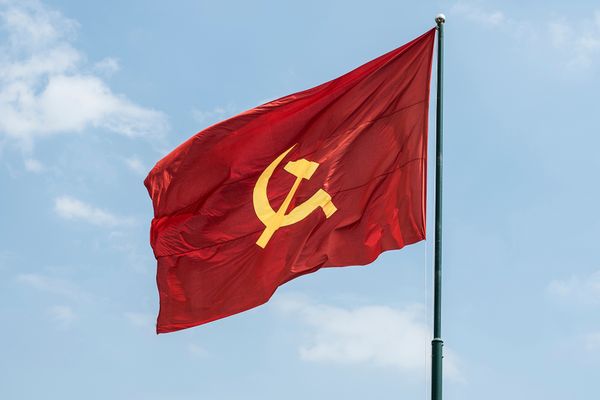5.1.7
Impact of the Nationalist Resurgence 2
Nationalism in the Eastern Bloc
Nationalism in the Eastern Bloc
Gorbachev tried to decentralise power in the Communist Party's power. But this led to leaders of the Eastern Bloc wanting to leave the Soviet Union.


Greater autonomy
Greater autonomy
- Gorbachev believed the best way to reform the politics of the USSR was to give more autonomy to the individual Republics.


Renegotiating the relationship
Renegotiating the relationship
- From 1990 to 1991, Gorbachev tried to negotiate a treaty to decentralise the Soviet Union.
- Mid-July 1991: Eight of the leaders of the republics had agreed on the Union of Sovereign States treaty.


Reaction of communist hardliners
Reaction of communist hardliners
- Hardline communists were not happy with the treaty. They thought it would cause the collapse of their government.
Historical Assessment of Nationalism
Historical Assessment of Nationalism
Historians disagree over the importance of nationalist pressures upon the USSR's demise.


Beissinger's view on nationalism
Beissinger's view on nationalism
- ‘In many narratives of the end of communism, nationalism is portrayed merely as a consequence of communism’s demise, not as a cause of the process of collapse itself. Such a story, however, leaves a number of critical issues unaddressed. Within the Soviet Union, enormous mobilisations involving millions of people occurred during these years, with nationalist demands being the most prominent among the banners under which people mobilised.'


Cohen's view on nationalism
Cohen's view on nationalism
- ‘In reality, no anti-Soviet revolution from below ever took place, certainly not in Russia... In an unprecedented referendum held in Russia and eight other republics in March 1991, which included 93 percent of the entire Soviet population, 76.4 percent of the very large turnout voted to preserve the Union - only nine months before it was abolished.’
1Communist Government in the USSR, 1917-85
1.1Establishing Communist Party Control, 1917-24
1.2Stalin in Power, 1928-53
1.2.1The Elimination of Opponents
1.2.2The Purges of the 1930s
1.2.3End of Topic Test - The Elimination of Opponents
1.2.4Stalin's Power Over the Communist Party
1.2.5Stalin's Power During & After the Communist Party
1.2.6End of Topic Test - Power Over the Communist Party
1.2.7A-A* (AO3/4) - Stalin in Power
2Industrial & Agricultural Changes
2.1Towards a Command Economy
2.2Industry & Agriculture in the Stalin Era
3Control of the People, 1917-85
3.1Media, Propaganda & Religion
3.2The Secret Police
4Social Developments, 1917-35
4.1Social Security
4.2Women & Family
5Historical Interpretations
5.1What Explains the Fall of the USSR, 1985-91?
5.1.1Economic Weakness
5.1.2Attempts at Economic Reform
5.1.3Failure To Reform The Communist Party & Soviet Gov
5.1.4Impact of Reforms
5.1.5End of Topic Test - Economic Reform
5.1.6Impact of the Nationalist Resurgence
5.1.7Impact of the Nationalist Resurgence 2
5.1.8End of the USSR
5.1.9Gorbachev & Yeltsin's Responsibility
5.1.10End of Topic Test - Nationalist Resurgence
5.1.11A-A* (AO3/4) - Explaining the Fall of the USSR
Jump to other topics
1Communist Government in the USSR, 1917-85
1.1Establishing Communist Party Control, 1917-24
1.2Stalin in Power, 1928-53
1.2.1The Elimination of Opponents
1.2.2The Purges of the 1930s
1.2.3End of Topic Test - The Elimination of Opponents
1.2.4Stalin's Power Over the Communist Party
1.2.5Stalin's Power During & After the Communist Party
1.2.6End of Topic Test - Power Over the Communist Party
1.2.7A-A* (AO3/4) - Stalin in Power
2Industrial & Agricultural Changes
2.1Towards a Command Economy
2.2Industry & Agriculture in the Stalin Era
3Control of the People, 1917-85
3.1Media, Propaganda & Religion
3.2The Secret Police
4Social Developments, 1917-35
4.1Social Security
4.2Women & Family
5Historical Interpretations
5.1What Explains the Fall of the USSR, 1985-91?
5.1.1Economic Weakness
5.1.2Attempts at Economic Reform
5.1.3Failure To Reform The Communist Party & Soviet Gov
5.1.4Impact of Reforms
5.1.5End of Topic Test - Economic Reform
5.1.6Impact of the Nationalist Resurgence
5.1.7Impact of the Nationalist Resurgence 2
5.1.8End of the USSR
5.1.9Gorbachev & Yeltsin's Responsibility
5.1.10End of Topic Test - Nationalist Resurgence
5.1.11A-A* (AO3/4) - Explaining the Fall of the USSR
Unlock your full potential with Seneca Premium
Unlimited access to 10,000+ open-ended exam questions
Mini-mock exams based on your study history
Unlock 800+ premium courses & e-books